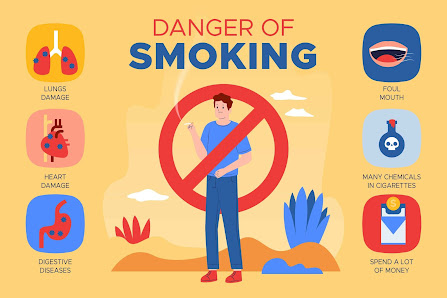5 Effective Ways to Quit Smoking Naturally
Smoking is a bad habit and it is too difficult to break. Not only is it highly addictive, but it also has many negative effects on our health, including an increased risk of lung cancer, heart disease, and stroke. Quitting smoking is essential for improving your health and reducing your risk of developing these serious conditions. Quitting smoking can be challenging, but there are natural ways to help you quit for good.

Here are five effective ways to quit smoking naturally:
Mindfulness Meditation
One way to quit smoking naturally is through mindfulness meditation. This technique involves focusing your attention on your breath and observing your thoughts and emotions without judgment. Research has shown that practicing mindfulness meditation can help reduce cravings and withdrawal symptoms associated with quitting smoking. By practicing mindfulness, you can become more aware of your triggers and learn how to manage them effectively.
Acupuncture

Acupuncture is an old Chinese execution that involves inserting needles in specific places in the human body. Studies have shown that acupuncture can help reduce nicotine cravings and withdrawal symptoms, making it an effective tool for quitting smoking naturally. The needles stimulate the release of endorphins, which are natural painkillers and mood enhancers that can help counteract the adverse effects of nicotine withdrawal.
Exercise
Regular exercise can also help you quit smoking naturally. Exercise helps reduce stress and anxiety, which are the common causes of smoking. It also releases peptides, which can boost your mood and reduce cravings. Additionally, exercise can help you manage your weight, which is important because many people gain weight after quitting smoking.

Herbal Remedies
Several herbal remedies can help you quit smoking naturally. One of the most popular is St. John's Wort, which has been shown to reduce the symptoms of nicotine withdrawal. Another popular herb is Lobelia, which is known for its ability to reduce cravings and make cigarettes taste unpleasant. Other herbs that may be helpful include Valerian root, Passionflower, and Kava.
Hypnotherapy
-min.jpg)
Hypnotherapy is a type of therapy that involves entering a state of deep relaxation and then receiving suggestions to change certain behaviors or thought patterns. It is effective in helping people quit smoking naturally. During hypnotherapy, a prepared therapist can assist you to distinguish the main causes of your smoking problem and furnish you with instruments to control your addiction.
Time Require
The amount of time required to quit smoking can vary depending on several factors, such as how long you have been smoking, how much you smoke, and your level of nicotine addiction. Quitting smoking is a process that can take time and effort, but it is possible to successfully quit smoking with the right support and strategies.

For some people, quitting smoking may be a gradual process, where they gradually reduce the number of cigarettes they smoke each day before eventually quitting altogether. This method is known as "cutting down to quit." This approach can take several weeks or even months to complete, depending on the individual's smoking habits.
Other people may choose to quit smoking "cold turkey," where they stop smoking abruptly and do not use any nicotine replacement therapies or other aids to help them quit. This method can be challenging, and withdrawal symptoms can be severe, but it can be effective for some individuals.
Regardless of the method used, it is important to remember that quitting smoking is a journey, and it may take multiple attempts to quit smoking for good. It is essential to seek support from friends, family, or healthcare professionals to help you through the process.
The benefits of quitting smoking can be felt immediately, with improved lung function, decreased blood pressure, and reduced risk of heart disease and stroke. However, the long-term benefits of quitting smoking can take years to manifest fully, with a decreased risk of developing chronic lung disease, cancer, and other smoking-related illnesses.
Health Problems

Smoking is a harmful habit that can lead to numerous health problems. Here are some of the main problems of smoking:
- Lung Cancer: Smoking is the leading cause of lung cancer, a disease that is responsible for more deaths than any other type of cancer. Smoking can cause cancerous cells to grow in the lungs, which can spread to other parts of the body.
- Heart Disease: Smoking is a major risk factor for heart disease. It can cause the arteries to narrow, making it harder for blood to flow through them. This can lead the smoker to heart attacks, strokes, blood pressure, and other heart problems.
- Respiratory Problems: Smoking can cause many respiratory problems such as COPD, chronic bronchitis, emphysema, and asthma. These conditions can make it difficult to breathe and can cause coughing, wheezing, and shortness of breath.

- Reproductive Problems: Smoking can also cause reproductive problems, including infertility, erectile dysfunction, and complications during pregnancy.
- Premature Aging: Smoking can accelerate the aging process, causing wrinkles, fine lines, and other signs of premature aging.
- Secondhand Smoke: Smoking not only harms the person who smokes, but it can also harm those around them. Secondhand smoke can cause the same health problems as smoking, including lung cancer and heart disease.











This was a great article.
ReplyDelete
ReplyDeleteВы не берете AdSense Improval